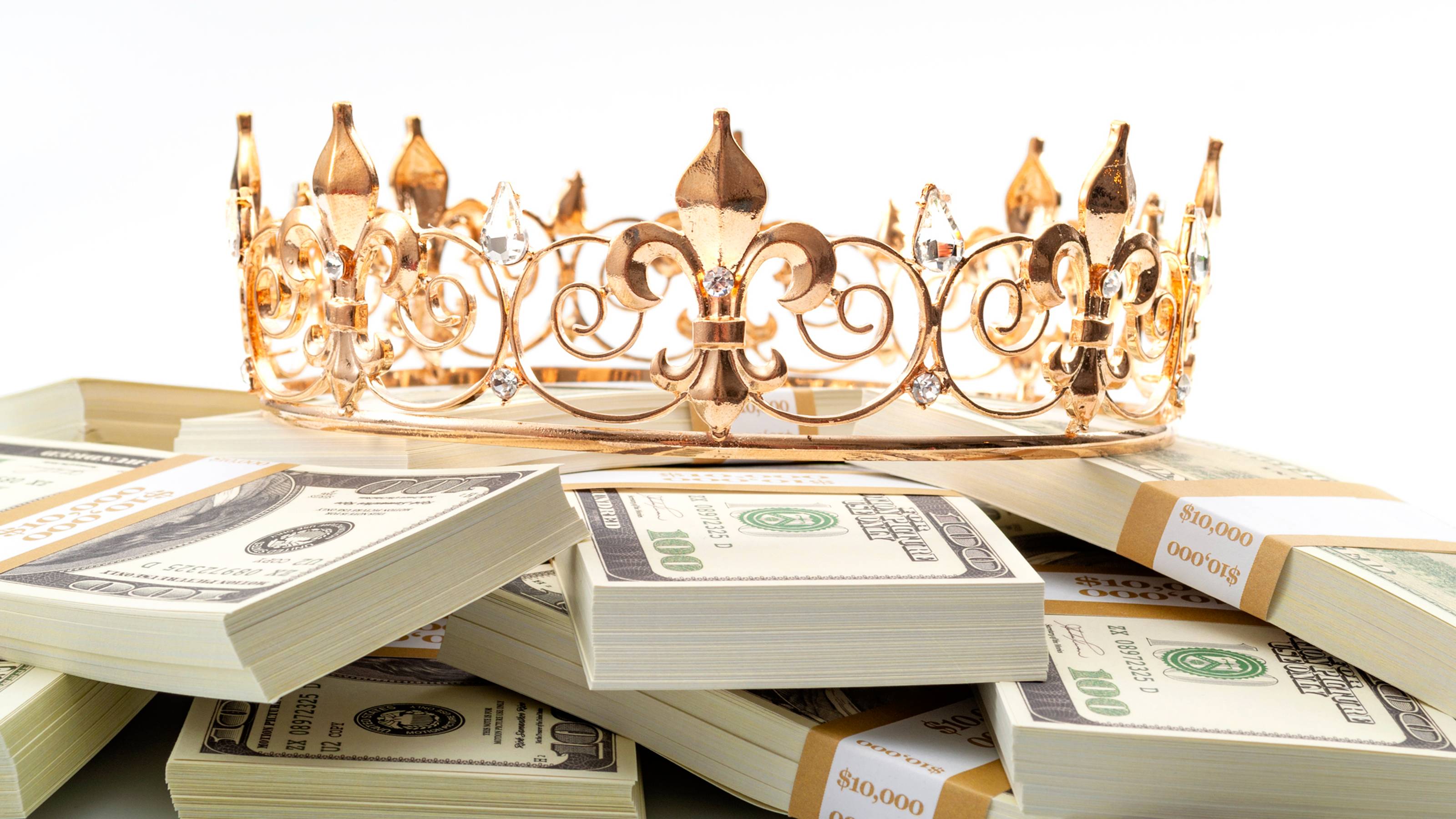Growing Risk in REITs
REIT shares are flying high, but eventually they’ll run out of fuel. Will it be a crash landing?

Profit and prosper with the best of Kiplinger's advice on investing, taxes, retirement, personal finance and much more. Delivered daily. Enter your email in the box and click Sign Me Up.
You are now subscribed
Your newsletter sign-up was successful
Want to add more newsletters?

Delivered daily
Kiplinger Today
Profit and prosper with the best of Kiplinger's advice on investing, taxes, retirement, personal finance and much more delivered daily. Smart money moves start here.

Sent five days a week
Kiplinger A Step Ahead
Get practical help to make better financial decisions in your everyday life, from spending to savings on top deals.

Delivered daily
Kiplinger Closing Bell
Get today's biggest financial and investing headlines delivered to your inbox every day the U.S. stock market is open.

Sent twice a week
Kiplinger Adviser Intel
Financial pros across the country share best practices and fresh tactics to preserve and grow your wealth.

Delivered weekly
Kiplinger Tax Tips
Trim your federal and state tax bills with practical tax-planning and tax-cutting strategies.

Sent twice a week
Kiplinger Retirement Tips
Your twice-a-week guide to planning and enjoying a financially secure and richly rewarding retirement

Sent bimonthly.
Kiplinger Adviser Angle
Insights for advisers, wealth managers and other financial professionals.

Sent twice a week
Kiplinger Investing Weekly
Your twice-a-week roundup of promising stocks, funds, companies and industries you should consider, ones you should avoid, and why.

Sent weekly for six weeks
Kiplinger Invest for Retirement
Your step-by-step six-part series on how to invest for retirement, from devising a successful strategy to exactly which investments to choose.
Analysts, bloggers, real estate dealmakers and managers of mutual funds are as puzzled as I am about the 90% rise in REIT indexes since March 2009. Commercial real estate lags the business cycle, so shares of real estate investment trusts normally do not rebound until after it’s apparent the economy is well off the bottom. Certainly we’re not there yet.
But in this stop-and-go recovery after the Great Recession, the timing for real estate investment has been backward. REIT buyers turned exuberant unusually early. Their spree since March 2009 has driven today’s share prices of property-owning REITs to 15% above the net asset value of the land and buildings the REITs hold. That’s far higher than the average historical premium of 2%. And the current premium exists while property values and office and retail rents are still flat or falling.
I would ascribe this REIT surge to general investor bullishness and a hunger for dividends rather than to a commercial real estate rebound. If the rally isn’t backed up by improved industry fundamentals soon it will crash and burn.
From just $107.88 $24.99 for Kiplinger Personal Finance
Become a smarter, better informed investor. Subscribe from just $107.88 $24.99, plus get up to 4 Special Issues

Sign up for Kiplinger’s Free Newsletters
Profit and prosper with the best of expert advice on investing, taxes, retirement, personal finance and more - straight to your e-mail.
Profit and prosper with the best of expert advice - straight to your e-mail.
Why are some so bullish? Some REIT analysts suspect that publicly traded REITs, which have better access now to the credit markets than highly leveraged private real estate investors, will poach fine properties cheaply from distressed owners. But that’s wishful thinking. The fact is, REITs face stiff competition for discounted trophy properties from Russian and Chinese billionaires and other global moneybags.
So be very cautious, and don’t be lulled by REITs’ image as stable investments. True, property-owning REITs show an outstanding 10% annualized total return for both the past ten years and the past 30 years. But after losing 18% in 2007 and 37% in 2008, the idea that REITs are low-risk investments doesn’t fly anymore.
Consider these drawbacks:
Valuation of shares
If you buy a broad REIT index fund now, it’s like investing in a fund that tracks Standard & Poor’s 500-stock index and paying a 15% premium for the assets. You obviously wouldn’t want to do that.
That’s a rough analogy because REITs are valued differently than regular common stocks. REIT share prices are generally compared with a measurement of net cash flow called funds from operations, or FFO. REITs are required to declare 90% of their taxable income as dividends, but they actually pay dividends out of FFO. So cash flow has to be strong, or REITs must dip into reserves, borrow to pay dividends, or distribute them in stock.
And cash flow isn’t great these days. Until rents recover and delayed or postponed development projects pay off, REITs will struggle to generate the healthy cash flow they need to further boost dividends and share prices.
Dividends
In 2009, property-owning REITs paid less in total cash dividends for the third consecutive year. The latest reason for this decline is because some widely held REITs, such as Developers Diversified Realty (symbol DDR), Simon Property (SPG) and Vornado Realty Trust (VNO), chose to pay from 41% to 90% of their 2009 dividends in stock instead of cash, a temporary concession by the Internal Revenue Service in recognition of the industry’s problems. (Simon and Vornado have since restored their dividends to cash. Developers Diversified is paying a token $.02 dividend,)
Shareholders will be furious if this practice continues through 2012, after which the IRS will stop permitting stock dividends. The decision to pay in stock “has been shortsighted and risks scaring off income investors,” says Gordon DuGan, chief executive of W.P. Carey, a real estate investment-management and finance company in New York City. Although share prices of stock-paying REITs have kept up with REIT averages the past year, the dilution to shareholders will eventually drag on the stock prices.
Debt
Most REITs must refinance or erase large balloon debts this year and next. The credit markets are no longer frozen, but banks are demanding -- and getting -- harsher terms to re-extend REIT debt. “The lenders are exacting their pounds of flesh,” says Mark Decker, who heads the real estate investment group at Robert Baird, a Milwaukee investment firm. He talks of a “penalty box” to which REITs with a certain debt level -- a level that’s far lower than it was prior to 2008 -- will be sent. REITs in that penalty box will be forced to make secondary stock offerings to repay debt, and that will lead to additional dilution of the stockholders.
Mergers and acquisitions
Don’t expect that strong REITs swallowing weak ones will bid up REIT prices. The reason: There’s not a lot of cash available for mergers because most REITs’ cash is already spoken for to pay down high debt and pay dividends. So the pace of mergers in REIT-land stands to be slow in 2010 and 2011 -- unlike a few years ago, when REIT buyouts at big premiums were common.
Safe havens
A few REITs stand out because they don’t have to refinance much debt soon -- or don’t owe any to speak of. Here are five REITs I wouldn’t be afraid to own regardless of what happens to the economy or to overall REIT price picture. These held up much better than most REITs in 2007 and 2008 and will deliver strong returns in good times. All pay regular cash dividends and neither cut them recently nor issued stock instead of paying cash. In alphabetical order:
Corporate Office Property Trust (OFC, $38, 4.2%) is a big landlord in the thriving Washington, D.C., area. It’s known for owning high-security buildings used in secure government operations. Decker, the Baird real estate expert, jokes that Corporate Office’s “CEO can’t even get into some of his own properties.” (All prices and yields are as of March 4.)
Essex Property Trust (ESS, $88, 4.7%) owns luxury apartments in West Coast cities and has moderate debt and high occupancy -- more than 97% at last count.
Health Care REIT (HCN, $42, 6.4%). One of the least indebted of the half-dozen or so REITs that own medical buildings, it’s also exquisitely diversified, with 590 properties in 39 states.
Public Storage (PSA, $86, 3.1%). The leader in, uh, public-storage space is financially strong, and its properties produce consistent results in both weak and strong economies.
Realty Income (O, $28, 6.1%). A different kind of critter, this REIT owns individual retail buildings and leases them on a triple-net basis (the tenant pays operating costs such as insurance as well as rent) to nationally known chains. It’s famous for paying dividends every month. No long-term debt is due in 2010,2011 or 2012, short-term debt is modest, and 97% of its properties are occupied.
Profit and prosper with the best of Kiplinger's advice on investing, taxes, retirement, personal finance and much more. Delivered daily. Enter your email in the box and click Sign Me Up.

Kosnett is the editor of Kiplinger Investing for Income and writes the "Cash in Hand" column for Kiplinger Personal Finance. He is an income-investing expert who covers bonds, real estate investment trusts, oil and gas income deals, dividend stocks and anything else that pays interest and dividends. He joined Kiplinger in 1981 after six years in newspapers, including the Baltimore Sun. He is a 1976 journalism graduate from the Medill School at Northwestern University and completed an executive program at the Carnegie-Mellon University business school in 1978.
-
 Dow Adds 1,206 Points to Top 50,000: Stock Market Today
Dow Adds 1,206 Points to Top 50,000: Stock Market TodayThe S&P 500 and Nasdaq also had strong finishes to a volatile week, with beaten-down tech stocks outperforming.
-
 Ask the Tax Editor: Federal Income Tax Deductions
Ask the Tax Editor: Federal Income Tax DeductionsAsk the Editor In this week's Ask the Editor Q&A, Joy Taylor answers questions on federal income tax deductions
-
 States With No-Fault Car Insurance Laws (and How No-Fault Car Insurance Works)
States With No-Fault Car Insurance Laws (and How No-Fault Car Insurance Works)A breakdown of the confusing rules around no-fault car insurance in every state where it exists.
-
 The Most Tax-Friendly States for Investing in 2025 (Hint: There Are Two)
The Most Tax-Friendly States for Investing in 2025 (Hint: There Are Two)State Taxes Living in one of these places could lower your 2025 investment taxes — especially if you invest in real estate.
-
 The Final Countdown for Retirees with Investment Income
The Final Countdown for Retirees with Investment IncomeRetirement Tax Don’t assume Social Security withholding is enough. Some retirement income may require a quarterly estimated tax payment by the September 15 deadline.
-
 Stock Market Today: Dow Soars 511 Points After McDonald's Earnings
Stock Market Today: Dow Soars 511 Points After McDonald's EarningsAll three indexes notched impressive gains Monday ahead of a jam-packed week on Wall Street.
-
 Why Investors Needn't Worry About U.S. Credit Downgrade
Why Investors Needn't Worry About U.S. Credit DowngradeFitch Ratings The United States saw its credit rating downgraded for just the second time in history, but experts aren't worried about the long-term damage to stocks.
-
 Highest-Yielding Dividend Stocks in the S&P 500
Highest-Yielding Dividend Stocks in the S&P 500LyondellBasell, Healthpeak Properties and Conagra head the list of the highest-yielding dividend stocks in the S&P 500. Some of the other names might surprise you.
-
 Best Dividend Stocks to Buy for Dependable Dividend Growth
Best Dividend Stocks to Buy for Dependable Dividend Growthdividend stocks How do you find the best dividend stocks to buy? Income investors know there's no substitute for regular dividend increases over the long haul.
-
 The Best Monthly Dividend Stocks to Buy Right Now
The Best Monthly Dividend Stocks to Buy Right NowYour bills come monthly. Why not your dividend checks? These are some of the best monthly dividend stocks for income planning.
-
 Income-Investing Picks for a Recession
Income-Investing Picks for a RecessionInvesting for Income Some consequences of an economic downturn work to the benefit of fixed-income investors. Here are three fund ideas that fit the bill.